Reviews
Stanley Kubrick
USA, 1957
Credits
Review by Sammy Wasson
Posted on 05 March 2010
Source MGM DVD
Categories Kubrick
To watch Paths of Glory, Kubrick’s first masterpiece, fifty years after its release, is to oversee the great web of Kubrick’s career. In each direction you can see a strand of thought leading on toward a film of the future. In time, the bravura dolly shots that follow General Mireau through the trenches of World War I, will become the unyielding long takes of Full Metal Jacket, following Gunnery Sergeant Hartman as he dispenses his savage insults to his platoon. The expansive white interiors of General George Broulard’s chateau, sterile in their civility, will be reprised to similar effect in 2001, A Clockwork Orange, and Eyes Wide Shut, films in which places of elegance - like the barren theater where Alex’s cronies do their raping, and the cite of the latter film’s famous orgy - are made desolate and cold. And Paths of Glory’s execution scene, as painful a moment as any Kubrick ever filmed, is composed with a stateliness that looks ahead to the excruciatingly paced duels of Barry Lyndon.
There are nascent proclivities here, but none is more pervasive, or upsetting, than the thematic strand connecting Paths of Glory to Dr. Strangelove—futility in the face of cold-blooded savagery. Looking at the iniquities of war, with its bloodsoaked barracks and Kafkaesque bureaucracies, there seem to be only two reasonable responses: one can either scream in horror or laugh in disbelief. Paths of Glory is Kubrick’s dramatization of the former; Strangelove, the latter.
Paths of Glory - a film about three men portentously court-marshaled and executed to justify the horrid incompetence of their superiors - is fueled by ironic tensions of guilty innocents and innocent criminals, a fact that Kubrick reiterates structurally, through his use of incongruous contrasts. We are not meant to laugh at the awful hard cut that takes us from the aftermath of an execution to teatime. We’re meant to recoil, as Kubrick does, from “civilized” apathy. Like Kubrick’s Humbert Humbert, Generals Mireau and Broulard are all manners and no man. Worse than mere pretense, their so-called refinement and intellectual sophistication is actually antithetical to human dignity. Paths of Glory’s court-marshal, governed by a cluster of highly decorated officials, is a display of vaulted iniquity, positing the formal values of due process over the needs of man. “Gentlemen of the court,” says Dax, “there are times that I’m ashamed to be a member of the human race, and this is one such occasion.” To be a gentleman of the sort Dax is addressing is to know nothing of what it means to be human.
Though Paths of Glory is far from Kubrick’s most pessimistic film, it’s certainly his angriest. Not even A Clockwork Orange, for all of its violence and excess, will outdo the virulence and anguish seen here. But why? Did Kubrick become more complacent as he aged? Obviously not: who would call The Shining complacent? Did he lose his interest in cruelty? Hardly: even Eyes Wide Shut, his last picture, is mired in hostility—and in the scariest place of all, the bedroom. What makes Paths of Glory Kubrick’s angriest, and therefore most heartfelt picture, is the sense that hope can exist alongside atrocity.
Beginning with Kirk Douglas’ Colonel Dax, Paths of Glory is brightened by a handful of honorable figures—the innocents in the trenches. These are people even a budding cynic like Kubrick can’t deny and he wisely gives them their due. In the ditch and in the prison, in the courtroom and on the battlefield, Kubrick doles out empathic, mournful close-ups of those who are waiting to die, like handshakes to parting heroes. Amongst the brave, there is no character too fleeting to receive an affectionate sendoff, a moment alone before Kubrick’s appreciative lens. In this context, Douglas’s hammy tendencies are justified. Compared to the stolid remove of actors Adolph Menjou and George Macready, the star’s fervor lends a healthy adamancy to his cause. Indeed there is hardly another character in all of Kubrick who will be moved to such highly emotional extremes, and will be made to see all the nobler for it. And yet, never once does compassion temper Dax’s - or Kubrick’s - vehemence. It only sharpens it.
In Paths of Glory’s final scene, the song of an innocent German girl briefly turns a barroom of hecklers into a sympathetic audience. But according to Kubrick, a moment of empathy does not undo the hard, unalienable fact of human agony. “No matter how you interpret that scene,” Kubrick said, “the hope is a very limited kind of hope. Even in the scene where the men are crying and are obviously touched by the German girl’s singing we were not trying to say ‘Gee! These guys are really wonderful’ because they do start off being as mean as anyone in the whole story. The only thing we wanted to say was that life is not completely downbeat as it often seems to be.”1
As he ages, Kubrick will revise this stance. After Spartacus in 1960, mounting cynicism will destabilize his compassion - even for the victims - and his humanitarian impulse will be replaced with narrow-eyed incredulity. Throughout the sixties, the battle for human dignity will favor the Machiavellians, and by the seventies, Kubrick will declare a winner (and it won’t be good news for the singing German girls of the world). But in the meantime, before the HAL 9000s begin the charge against us, Paths of Glory offers a fleeting glimmer of Kubrickian ardor.
- From “Conversation with Stanley Kubrick,” by Jay Varela. El Playano, Loyola Marymount University, Spring 1958.
More Kubrick
-
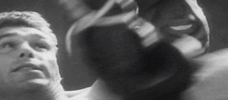
Stanley Kubrick’s Early Documentaries
1951-53 -
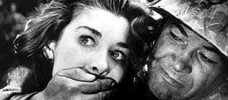
Fear and Desire
1953 -

Killer’s Kiss
1955 -
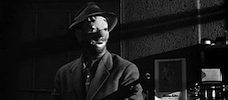
The Killing
1956 -
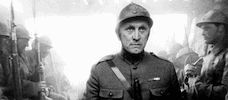
Paths of Glory
1957 -
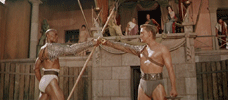
Spartacus
1960 -

Lolita
1962 -
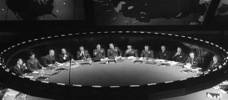
Dr. Strangelove or: How I Learned to Stop Worrying and Love the Bomb
1964 -

2001: A Space Odyssey
1968 -

A Clockwork Orange
1971 -

Barry Lyndon
1975 -
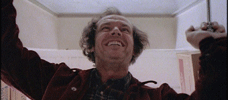
The Shining
1980 -

Full Metal Jacket
1987 -
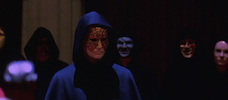
Eyes Wide Shut
1999 -

A.I.
2001
We don’t do comments anymore, but you may contact us here or find us on Twitter or Facebook.



